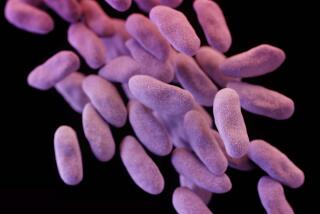When obesity is an inherited trait, maybe gut bacteria is the link
- Share via
When wondering whether genes are contributing to your struggle with weight, a new study suggests it might be useful to look within -- at the garden of bacteria growing in your gut.
In particular, you might well wonder whether, in addition to their failure to bequeath you the genes for athletic prowess and a strong jaw line, your parents also failed to pass on a genetic predisposition to play host to the bacterium Christensenella minuta in abundance. In a new study that explored the fecal samples of 416 twin pairs in the United Kingdom, researchers found evidence to suggest that this strongly heritable strain of gut bacterium protects against obesity.
The new research, which draws a line between genes and obesity that passes through the garden of intestinal bacteria, was published Thursday in the journal Cell. The research was led by Julia K. Goodrich and Ruth E. Ley of Cornell University’s Department of Molecular Biology and Genetics.
Nobody would deny that parents’ girth exerts a powerful influence on their children’s propensity to becoming overweight or obese. But how much of that is nature -- genetics -- and how much is nurture -- family consumption patterns and preferences -- has become a subject of highly active research.
Researchers exploring the hot field of gut microbiota are turning up new evidence that both genes and consumption patterns -- nature and nurture -- contribute to the mix of microorganisms that flourish in the intestinal tract. At the same time, they’re finding growing evidence that that mix of microorganisms influences an individual’s risk of obesity. The current study sought to characterize and explore the power of that genes-microbiota-obesity relationship.
Why collect and analyze twins’ poop to see whether the mix of gut microbiota is an inherited trait?
Because twins come in two flavors: identical -- those who share virtually all of their DNA because they came from the same eggs and sperm; and fraternal -- those who share no more DNA than any pair of siblings because they come from two separate unions of eggs and sperm. If some feature of gut bacteria (say, its diversity or the copious presence of some strain) is more dramatically shared by identical twins than by fraternal twins, scientists can infer that genes likely play a key role in determining that feature. If fraternal and identical twins (when raised in the same household) differ little in the composition of their microbiota, there’s a good bet that their environment is strongly shaping what grows in their intestinal tract.
The British twin study suggested that genes play a key role in whether an individual will host several strains of bacteria -- including C. minuta -- in abundance. And it found that levels of bacteria in the Bacteroides family seem to be influenced more by environment than by genes.
But then, researchers went further: In a series of experiments with mice, they sought to confirm that highly heritable strains of gut microbiota could influence obesity. First, they harvested the mix of gut microflora found in twins who appeared to have inherited high concentrations of C. minuta. Then, they created several fecal “transplant” packages, including some that were wholly from obese twins and some that were an “enriched mix” of obesity-related microbiota and C. minuta. Finally, they transplanted these packages of microbiota into 6-week-old mice that were germ-free.
The result: In the span of just 12 days, mice with higher concentrations of C. minuta in their gut were leaner than those who had gotten the gut flora from an obese person.
“This paper is part of a rapidly growing effort to define the interrelationships between our human genetic variations, variations in the compositions of our gut microbial communities, our diets, and our health status,” said Dr. Jefffrey I. Gordon, director of a newly established Center for Gut Microbiome and Nutrition Research at Washington University School of Medicine in Missouri.
One outcome, he said, would to determine how our gut microbial communities are causally related to health and disease risk. Researchers also need a “keener, better appreciation of how the nutritional value and effects of our diets is shaped in part by differences in consumers’ gut communities” he added, and how and gut microbes may “transform components of their diets into products that impact our wellness.”
This, the authors wrote, is just the beginning of a lengthy effort that may help identify ways to combat obesity. It will be like finding a needle in a haystack to locate the specific genes that predispose an individual to hosting C. minuta in abundance (not to mention any of the countless other strains of gut bacteria that may be heritable and influence obesity). But that would be the next step to “eventually exploit [these health associated bacteria] to promote health,” the authors wrote.
Follow me on Twitter @LATMelissaHealy and “like” Los Angeles Times Science & Health on Facebook.






